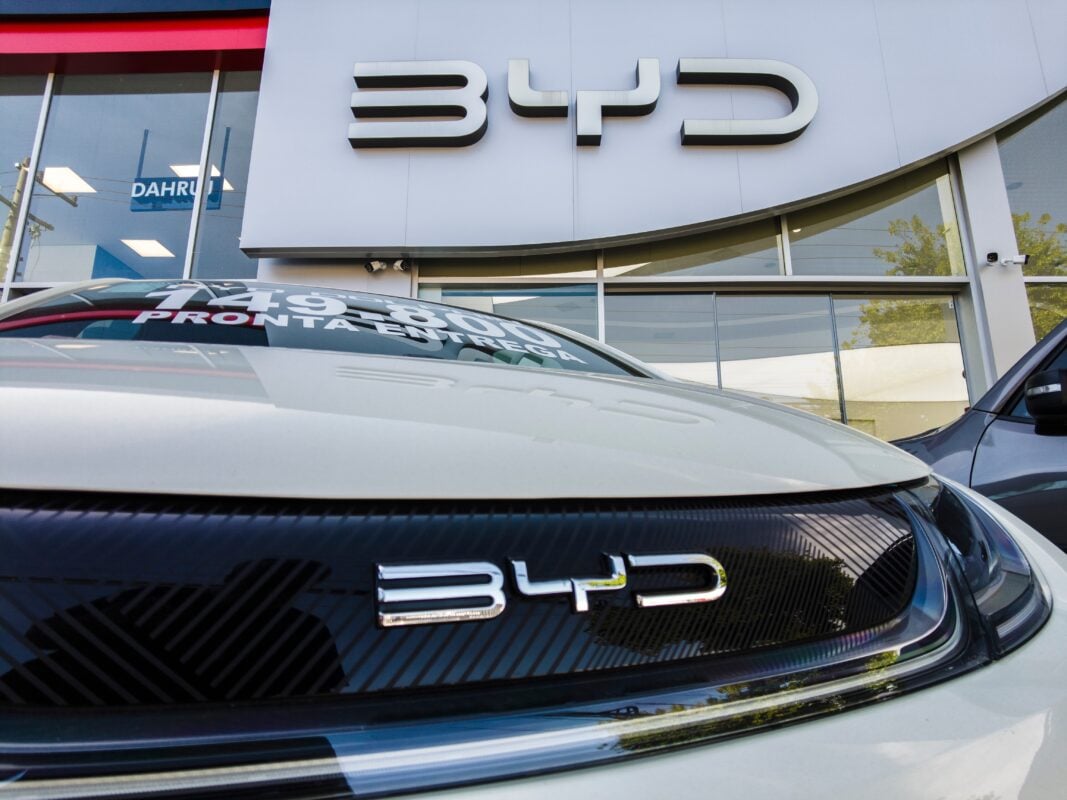TLDRs;
Contents
- Chinese automakers expand in Germany with hybrids and EVs, bypassing EU tariffs through localized production and partnerships.
- BYD’s European sales surge past Tesla as the company introduces its Seal 06 DM-i Touring hybrid in Munich.
- Xpeng and Leapmotor debut new sedan and hatchback models tailored to European drivers and urban markets.
- Chery launches Omoda and Jaecoo brands in Germany, focusing on hybrids to avoid EU trade penalties.
Chinese automakers are accelerating their European expansion with new hybrid and electric vehicle (EV) launches in Germany, signaling intensified competition in the continent’s auto market.
At the upcoming IAA Mobility 2025 show in Munich, Chery, BYD, and Xpeng will unveil fresh models aimed at appealing to European consumers amid trade tensions and a tightening price war.
Data from July shows Chinese brands accounted for 9.9% of EV sales and 5.3% of the overall European auto market, according to Dataforce. Despite heavy tariffs from the European Union, Chinese manufacturers are finding ways to grow their market presence, including localized production and hybrid-focused strategies.
BYD challenges Tesla in Europe
BYD, now outselling Tesla in Europe, is using Germany as a launchpad for its latest models. At Munich, the company plans to debut the Seal 06 DM-i Touring, a plug-in hybrid station wagon designed to compete with established favorites like the Volkswagen Passat.
A big moment is coming in Munich. 🇩🇪⚡
At IAA Mobility 2025, BYD will celebrate the European debut of the SEAL 6 DM-i TOURING and bring our cutting-edge technologies to life with two public stands.
We can’t wait to see you in Munich and share the next chapter of our journey… pic.twitter.com/3cPLRtuNWl
— BYD Global (@BYDGlobal) August 28, 2025
To strengthen its European position, BYD is building factories in Hungary and Turkey. This localized production strategy allows the company to sidestep EU tariffs of up to 47.6% on Chinese EVs, while also signaling a long-term commitment to the region.
The move comes as BYD’s European registrations surged 225% to 13,503 units in July, compared to Tesla’s 40% decline to 8,837 units. This shift underscores how Chinese automakers are gaining ground against traditional market leaders.
Xpeng and Leapmotor reveal new designs
Xpeng will showcase an updated version of its P7 sedan, tailored to European tastes with upgraded interior tech and improved range. Leapmotor, meanwhile, is set to debut its B05 hatchback, a compact EV positioned directly against popular European models in the urban mobility segment.
Both brands are leveraging partnerships with European automakers to strengthen their reach. Stellantis, the maker of Peugeot and Fiat, has already announced plans to co-build EVs with Leapmotor in Spain, providing Chinese automakers access to Europe’s single market while avoiding heavy import tariffs.
Chery enters Germany with Omoda and Jaecoo
Chery, one of China’s fastest-growing automakers, will expand into Germany with its Omoda and Jaecoo brands, offering both EVs and plug-in hybrids. By diversifying its lineup, Chery aims to tap into demand from German buyers seeking affordable alternatives to premium European models.
The hybrid strategy is especially significant. Unlike pure battery-electric vehicles, hybrids are not targeted by the EU’s steepest tariffs, making them a practical entry point for Chinese automakers.
This also allows companies like Chery to build dealer networks and establish brand recognition before scaling up their all-electric offerings.
Chinese suppliers strengthen ecosystem
Beyond the automakers themselves, Chinese tech firms and suppliers such as CATL, Hesai, DeepRoute.ai, and Momenta will also feature at the Munich show.
Their presence highlights the growing influence of China’s automotive ecosystem in Europe, from battery manufacturing to autonomous driving technologies.
This ecosystem-driven approach positions Chinese companies not just as carmakers, but as central players in the future of European mobility.


